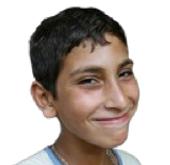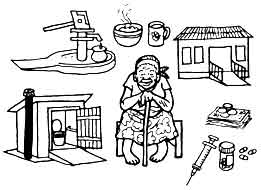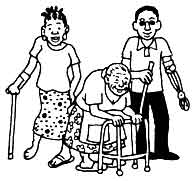Your progress
0%
In the activities suggested below, CBR programmes should work in partnership with people with disabilities and their representative organizations. Use your mouse or keyboard to expand each of the activity headings below. To add an activity to your action plan, select the Add button beside it.

Social protection is an integral element of a comprehensive approach to disability. CBR needs to work in partnership with DPOs to ensure that all people with disabilities are covered under existing social protection measures, whether these are provided through a social security system, a social assistance programme or an informal scheme. To do this effectively, CBR needs to:

CBR needs to be aware of programmes and services that are in place to ensure that families are adequately provided with food and water. CBR also need to work to ensure that the specific requirements of persons with different types of disabilities are adequately taken into account. This may be done in partnership with DPOs.
Access to toilet facilities are a big problem in many parts of the, where many people do not have a toilet in their home and need to use the natural environment instead. It is difficult for people with disabilities, especially women with disabilities, to do this. CBR needs to work with local authorities to ensure adequate toilet facilities and water supplies.
The cost of renting suitable accommodation can be higher for people with disabilities than for others because, for example, they may require a ground floor flat. Discrimination in housing provision is often encountered by people with disabilities. CBR needs to be aware of this problem and act as advocate with the relevant authorities to ensure equality of opportunity and treatment for people with disabilities and their families.
Accessible accommodation may also become a problem when individuals with disabilities leave home to attend training, seek employment or start a small business in another location. People with disabilities may not be able to use the available accommodation because it is inaccessible. CBR needs to be familiar with the accessibility requirements of individuals with disabilities, and work closely with relevant agencies to secure suitable housing. Where public housing is being planned, CBR should seek to ensure that the housing is fully accessible, affordable and developed in a way that will contribute to the participation of people with disabilities in their communities.
People with disabilities need to be able to access health-care services on an equal basis with others.
Some people with disabilities will need health care specific to their health condition or impairment. They may also need assistive devices.
CBR needs to learn where health care services and assistive devices are available in the local area and pass on this information to people with disabilities and their families. In some cases, CBR will directly arrange or facilitate the provision of suitable care or assistive devices. Where such devices are available from the government or non-governmental organizations, this information should be made widely known to persons with disabilities.
Some people with disabilities may require personal assistance with daily care and support. Personal assistance can be provided in communities by volunteers, who are often family members trained in these roles. Where DPOs and NGOs do not provide personal assistance training, CBR personnel have a central role to play in organizing such training. Fundamental to the provision of personal assistance is the recognition that the person with a disability should be able to choose his or her assistant.

In some countries, governments provide allowances to cover disability-related costs related to transport, accessible housing, assistive devices or adaptations to everyday articles and equipment. They may also include the cost of loss of earnings by volunteer caretakers, who are mainly women.
Where such provisions are in place, CBR programmes need to know about these programmes, make information about them available to people with disabilities, and support individuals who are eligible to take advantage of these programmes.